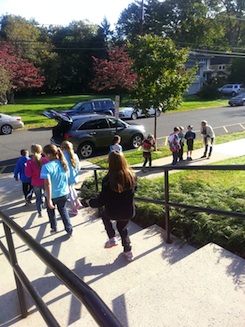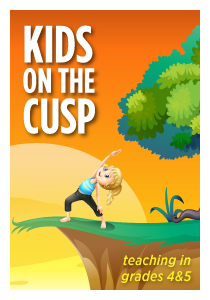Assessing myself: The family & community outreach rubric
A MiddleWeb Blog
Shortly after the dismissal bell rang on the half day before Thanksgiving, I found myself sitting in a booth at a diner. Across the table was a kid who had been a member of my first classroom, quite a few years ago.
Kid isn’t the right word. This little redhead, with a face full of freckles, was now a young man. I found myself smiling as I sat there, bacon cheeseburger in hand, and assessed what kind of young man he had become.
Thanksgiving is the official time of year to reflect on our lives, to assess how far we’ve come along the winding road, and to look back and recognize the many things there are to be thankful for. This young man, now working in finance outside of Washington, D.C., had emailed earlier that morning. He was in town for the holiday weekend. He was wondering if I was free to catch up.
Eric had been in touch over the years. He came by to let me know he’d passed his driving test when he was in high school. He’d popped in here and there throughout the last decade and a half to fill me in on his life (I still have the food-web/food-chains game board he created during a Life Science unit sixteen years ago).
When I find myself a bit frustrated with circumstances surrounding the responsibilities that lie before us as educators, I can lose focus on what matters most. When this happens, I need to remember the “Eric’s” in my life, the kids and the parents who continue to come back, to reach out, to express an interest in sharing their successes and their failures with me. Visits from former students let me know that, for many of them, I was Highly Effective.
Eric has matured into a grounded, curious, adventurous, and contemplative young man. I’d like to think I had little something to do with it…just a little.
And speaking of self-evaluation . . .
The second to last domain in my continuing quest for objectivity as an educator, asks us to look at our “Erics” and their families, to reflect on ourselves as community members, and as members of a school family.

There are areas in which I have been Highly Effective (whether the words “all students” or “at all times” should be included in any rubric is a topic for another day). There are also areas in which the description of Partially Effective fits the bill.
I am thankful on this day, a few weeks after Thanksgiving, that the words highly, partially, and effective are all subject to interpretation. That leaves a little wiggle room for a more accurate assessment. Hereforth, the next Marshall teacher self-assessment rubric, compliments of the State of New Jersey.
Family and Community Outreach
a) Respect is mutual. I have had an incredible level of support from most of the people whom I’ve met within the walls of our school. Communicating respectfully with parents, and being sensitive to different cultures and family values, is vital. I don’t always agree with certain family values, but that isn’t the point. There have been a handful who make this goal a bit more challenging. My level of effectiveness in this area is weaker when respect isn’t reciprocated. I am thankful that it usually is.
b) Belief in the curiosity, honesty, and resilience of children makes it easy to be hopeful for each one of my kids. Communicating this belief to parents, that their child will meet grade level standards, isn’t always possible. Many kids struggle with learning disabilities, and their own personal “standards” need to be identified.
c) Expectations, with respect to setting high goals for my students, are essential. During my first year as a teacher, one parent looked me in the eye and said, “I think you are expecting too much.” My response was, “Maybe you’re not expecting enough.” I was communicating respectfully. She just didn’t agree with me (or my expectations). We developed a mutual respect by the middle of the school year. Five years later she helped a friend of mine get a job.
d) Communication isn’t always easy, especially when you need to communicate that a child is struggling more than a parent realizes, or is able to hear.
e) Involving myself in the lives of my students has been a useful tool in improving my effectiveness as a communicator. I’m lucky. Because of the relationships I’ve developed with my kids and their families, I know them better. This helps me understand them as learners who are impacted by their lives outside of school.
f) Homework is something I have a love-hate relationship with. Marshall’s rubric identifies success with giving kids “highly engaging” homework. I want to see them “highly engaged” in schoolwork, to witness their thought processes, group work, and overall demeanor. These informal assessments help paint the whole picture. I assign “practice” for homework, and ask parents to allow their child to develop independence. I use homework for assessment of independent ownership of curriculum concepts and learning objectives and to help guide instruction. (I need the traditional grade for report cards, too).
g) Responsiveness asks us to deal with parent concerns that arise immediately and successfully. Immediately doesn’t sound realistic to me. I try to get back to families and resolve issues as quickly as possible. It’s hard to be highly efficient in this area without the cooperation (and Respect – see above section in the rubric) of others.
h) Reporting requires that we use student-led conferences and informal talks to provide ongoing feedback to parents. Again, my level of effective is directly related to theirs. I enjoy many informal chats on the playground and in the halls. A student-led conference years ago involved a student who was “being picked on by another child in class,” according to her mother. When the three of us sat down, a more genuine truth came out. Her daughter admitted that she, in fact, was the instigator. All three of us had more clarity of purpose after that student-led meeting.
i) Outreach sounds like the same category as Reporting. To be highly effective in this area, I need to be “successful in working with all parents, including those who are hard to reach.” That’s a lofty goal.
j) Resources seem to be diminishing (along with state funding), but there are many creative ways to enlist the help of the community in an effort to enrich the curriculum (like this video about our involvement in The Walking Classroom describes). When you gain people’s respect, they are more than willing to help.
The only rule in our classroom is “Respect.” This word hangs in plain view. The beauty of this single rule is that it is broad and open to interpretation, much like the state mandated rubrics that are now part of our lives.
The Thanksgiving leftovers may be gone, but I try to stay thankful for the Eric’s I have met along the way…and the ones I have yet to meet.































